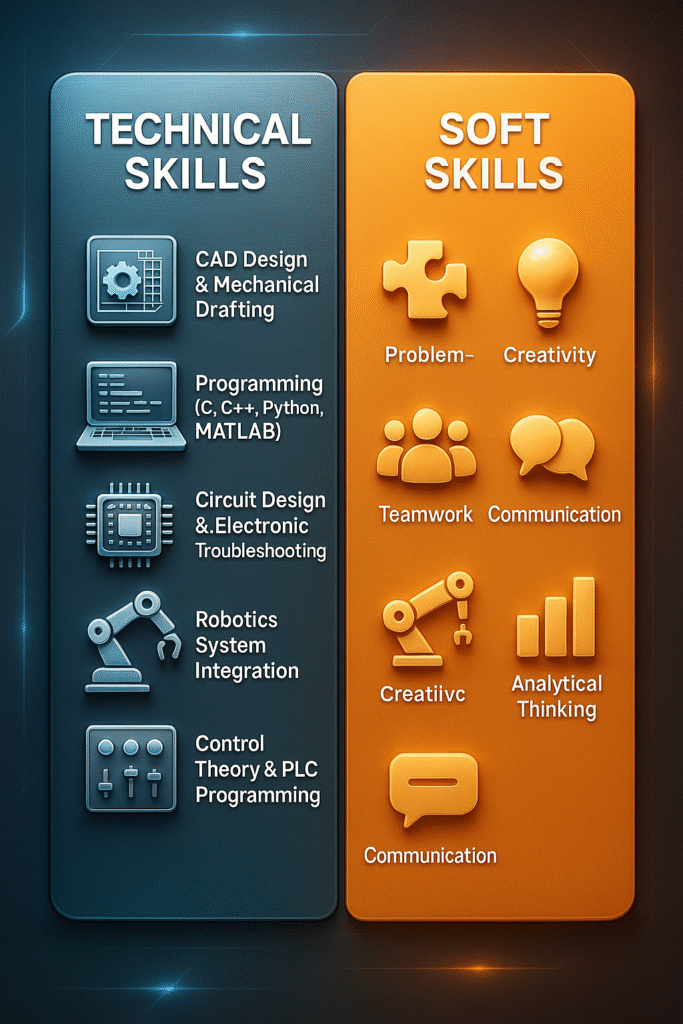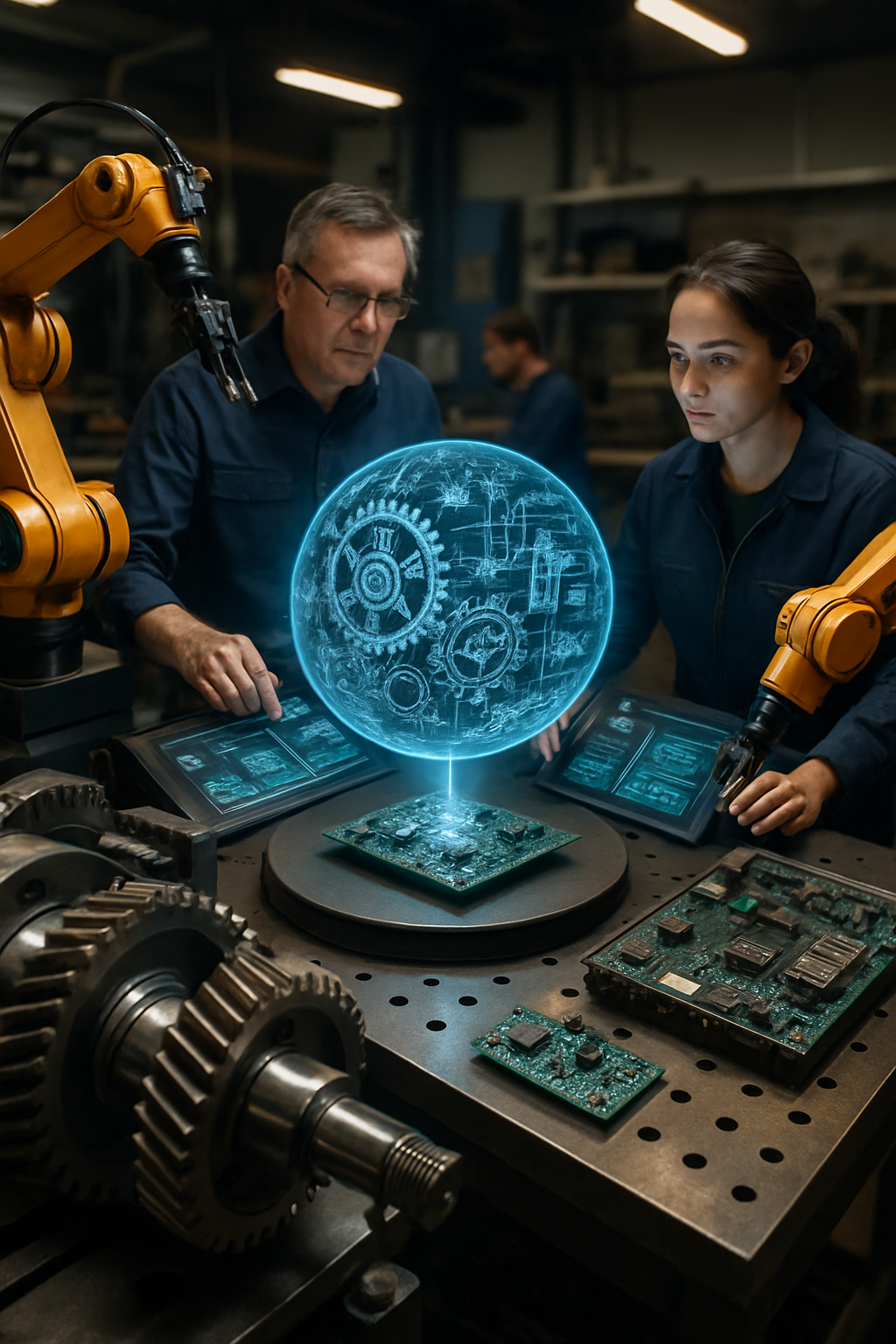Mechatronics is a thrilling and rapidly growing field in engineering. It combines mechanical engineering, electronics, control systems, software engineering, and automation into one discipline. This mix enables engineers to build machines that are smarter, faster, and more efficient than ever.
Imagine mechatronics as a bridge between the physical and digital worlds. In the past, mechanical and electronic systems worked separately. Now, in fields like car making and healthcare tech, mechatronics makes sure they work together perfectly.
What engineering mechatronics professionals do?
Mechatronics professionals handle the design, development, testing, and maintenance of systems. These systems mix mechanical parts with electronic controls and smart software.
Their tasks include:
- Creating automated manufacturing systems to make products faster and more accurately.
- Building robots for work, healthcare, or everyday items.
- Adding sensors and actuators to machines for better precision and safety.
- Building prototypes and testing their performance.
- Fixing and updating older systems to meet today’s standards.
In an auto factory, a mechatronics engineer might work on a robotic arm for assembling car doors. They need to know about mechanical motion, electronics for motor control, and programming for precise movements.
Core Disciplines in Mechatronics:
Mechatronics combines several key engineering and technology fields:
- Mechanical Engineering – Designs the physical parts of machines, like gears and motors.
- Electronics – Handles the control systems and power for the machine.
- Control Systems – Manages the logic and decision-making for efficient machine operation.
- Software and Programming – Creates scripts and code for machine automation.
- Sensors and Actuators – Allows machines to sense and respond to their environment.
- Integration – Makes sure all parts work together smoothly.
- Applications – Adapts mechatronic systems for various industries, like healthcare and logistics.
- Innovation and Automation – Advances technology for smarter systems and AI.
Example: A surgical robot is a great example. It uses precision mechanical arms (mechanical engineering), motor control (electronics), and algorithms (software). It also has sensors for real-time monitoring.
Day-to-Day Life of a Mechatronics Engineer:
A mechatronics engineer’s day often begins with checking system reports from the last shift. If they work in manufacturing, they might look into why a robot stopped working. They could then design a new prototype using CAD software and write its control code in C++ or Python.
In the afternoon, they test the prototype on the production floor.
Common Daily Tasks Include:
- Designing mechanical and electronic parts in CAD.
- Writing and testing control code.
- Doing maintenance checks on machines.
- Working with software developers and mechanical engineers.
- Running simulations to predict machine performance.
Exploring the Job of Mechatronics Engineer in Modern Sectors:
In the World, mechatronics specialists are in high demand across many sectors, including:
- Automotive Manufacturing – Designing robotic assembly lines for cars, trucks, and electric vehicles.
- Aerospace – Developing flight control systems and automated inspection tools for aircraft.
- Medical Devices – Creating surgical robots, imaging systems, and automated diagnostic tools.
- Renewable Energy – Building and maintaining automated wind turbine and solar panel systems.
- Consumer Electronics – Innovating in smart appliances, wearable devices, and entertainment technology.
- Logistics & Warehousing – Designing automated storage and retrieval systems used by companies like Amazon.
Key Skills Every Mechatronics Specialist Should Have:

To do well in mechatronics, you need both technical skills and soft skills:
Technical Skills:
- CAD design and mechanical drafting.
- Programming (C, C++, Python, MATLAB).
- Circuit design and electronic troubleshooting.
- Robotics system integration.
- Control theory and PLC programming.
Soft Skills:
- Strong problem-solving abilities.
- Creativity for innovative designs.
- Team collaboration skills.
- Clear communication for cross-disciplinary teamwork.
- Analytical thinking for performance optimization.
Mechatronics Engineering Pay: Salary Ranges and Earning Potential:
Salary Snapshot:
- Entry-Level: $65,000 – $80,000 annually
- Mid-Career: $85,000 – $100,000 annually
- Senior-Level: $110,000+ annually
Pay can vary based on location, industry, and experience level. Engineers in aerospace or high-tech manufacturing often earn more. Those in academic research may earn less but gain valuable experience.
Example: A mechatronics engineer in Silicon Valley designing robotic systems may earn more than one in a small-town factory.
The Future of Mechatronics:
The need for mechatronics engineers is set to skyrocket in the next ten years. This growth is fueled by several factors:
- More automation in making things.
- The increasing use of AI and machine learning in robots.
- More focus on renewable energy systems.
- Advancements in self-driving cars and trucks.
FAQs About Mechatronics:
1. Is mechatronics a good career in the US?
Yes. It’s a great career with high demand, good pay, and chances to work in new fields.
2. Do I need a degree to work in mechatronics?
Mostly, yes. You’ll need a bachelor’s degree in mechatronics, mechanical, electrical, or robotics engineering.
3. What companies hire mechatronics engineers?
Big names like Tesla, Boeing, and Lockheed Martin hire them. Also, Apple, Amazon Robotics, and General Electric.
4. Can I specialize within mechatronics?
Yes. You can focus on robotics, automation, embedded systems, or areas like aerospace or healthcare.
Conclusion:
Mechatronics is changing the engineering landscape in the World. It combines creativity with technical skills. This field offers a chance to work on cutting-edge technologies that affect many people’s lives.
If you enjoy solving tough problems and working with both hardware and software, mechatronics could be for you. It’s a career that’s ready for the future.

